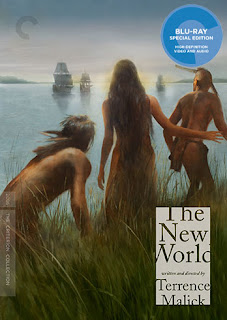Blu-Ray Review | "The New World"
Like most of Terrence Malick's filmography, The New World is a film whose beauty often defies words. It doesn't matter if you watch the more streamlined theatrical cut or the more abstract extended cut, The New World is a monumental work in any form. While Malick cut down the film for its theatrical release, the extended cut almost feels like a different film entirely - more loose, more elliptical, more in line with Malick's more recent works like To the Wonder and Knight of Cups. All three versions of the film, the first cut, the theatrical cut, and the final extended cut, are all included on Criterion's sumptuous new Blu-Ray package, which also includes and informative comparison of all three cuts.
Still, there's more of a plot-like structure here than there is in his later work, and The New World may mark his finest balance between plot and abstraction. Perhaps it is because the story he tells here is so familiar. The story of Pocahontas has been a part of American lore for centuries - the Native American princess who fell in love with John Smith, saved him from being executed by her father, and went on to marry John Rolfe before dying in England, a world away from her pristine homeland of what is now Virginia.
You can almost divide the film into two parts. The first half is about discovery - of a new world, of a new love, of one's self. It is awash in wonder and beauty (made even more breathtaking in its new 4K restoration on the Blu-Ray), and the heart-pounding, breathless yearning of first love. The second half is about disillusion, the death of innocence, and ultimately, the discovery of a new kind of love, less about unbridled passion and more about stability. Some may call the "settling," but Malick passes no such judgements here. Malick is the great cinematic observer, a poet-philosopher whose vision is presented through questions, musings, and a never-ending search for answers, both earthly and divine.
As is typical of Malick, the central love stories, between Pocahontas and Smith, then Pocahontas and Rolfe, are much more than they appear to be on the surface. Malick has constructed them as metaphors for the discovery of America - from its initial, untouched promise, to "destruction of Eden" that marks the end of the Natives' idyllic paradise, to the eventual acceptance of a new way of life, one that is not necessarily bad, but not as good as what came before.
In a sense, The New World is a deeply American love story, in which America is the object of desire. It is at once an elegy and a romance for a bygone world, one whose ramifications echo into our own world still today. Malick has much to say about the nature of love and desire here. But he also has a great deal to say about the nature and origins of America. Don't expect a political screed - Malick is far too lofty a filmmaker to sully himself with such mundanities. No, Malick reaches for the heavens, for an ideal. The New World is a search for the American soul, and we are still searching for it today. In today's heated political climate, it is a film that feels all the more vital - a probing, lyrical exploration of what makes us, as humans, as Americans, as inhabitants of this mortal plane, who we are.
GRADE - ★★★★ (out of four)
Now available on Blu-Ray and DVD from The Criterion Collection.
Special features include:
Still, there's more of a plot-like structure here than there is in his later work, and The New World may mark his finest balance between plot and abstraction. Perhaps it is because the story he tells here is so familiar. The story of Pocahontas has been a part of American lore for centuries - the Native American princess who fell in love with John Smith, saved him from being executed by her father, and went on to marry John Rolfe before dying in England, a world away from her pristine homeland of what is now Virginia.
As is typical of Malick, the central love stories, between Pocahontas and Smith, then Pocahontas and Rolfe, are much more than they appear to be on the surface. Malick has constructed them as metaphors for the discovery of America - from its initial, untouched promise, to "destruction of Eden" that marks the end of the Natives' idyllic paradise, to the eventual acceptance of a new way of life, one that is not necessarily bad, but not as good as what came before.
GRADE - ★★★★ (out of four)
Now available on Blu-Ray and DVD from The Criterion Collection.
Special features include:
- New 4K digital restoration of the 172-minute extended cut of the film, supervised by cinematographer Emmanuel Lubezki and director Terrence Malick and featuring material not released in theaters, with 5.1 surround DTS-HD Master Audio soundtrack on the Blu-rays
- High-definition digital transfers of the 135-minute theatrical cut and the 150-minute first cut of the film, supervised by Lubezki, with 5.1 surround DTS-HD Master Audio soundtracks on the Blu-rays
- New interviews with actors Colin Farrell and Q’orianka Kilcher
- New program about the making of the film, featuring interviews with producer Sarah Green, production designer Jack Fisk, and costume designer Jacqueline West
- Making “The New World,” a documentary shot during the production of the film in 2004, directed and edited by Austin Jack Lynch
- New program about the process of cutting The New World and its various versions, featuring interviews with editors Hank Corwin, Saar Klein, and Mark Yoshikawa
- Trailers
- PLUS: A book featuring an essay by film scholar Tom Gunning, a 2006 interview with Lubezki from American Cinematographer, and a selection of materials that inspired the production






Comments